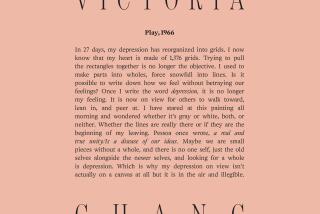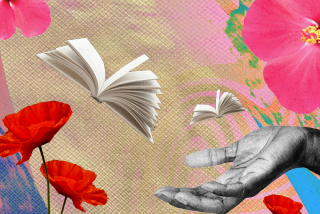Bill Knott’s unclassifiable poetry is collected in ‘I Am Flying Into Myself’
My favorite poem by the late Bill Knott (1940-2014), one of contemporary American poetry’s most brilliant, unclassifiable and impossible figures, is not included in “I Am Flying Into Myself,” the new book that culls from and attempts to organize the unruly literary legacy Knott left behind him. This unruliness was very much self-created. Knott, who was an orphan and spent some time in a mental institution as a teen, published his first book, “The Naomi Poems,” in 1968 under the pseudonym of St. Geraud, whom the flap copy claimed was dead.
From there, he went on to publish many books with many publishers, became a longtime and legendary teacher at Emerson College, maintained devoted friendships with many great writers — including Mary Karr, Charles Simic and Thomas Lux, the editor of this volume, who died suddenly on Feb. 5 — and confounded the poetry establishment again and again.
Though he was beloved by friends and students, bitterness was his default mode in correspondence and in his poetry — in the self-published books he would mail to anyone who wrote him in the last decade of his life, he’d print collages of his rejection letters from poetry magazines. But his poems, mischievous, riddling, often hilarious, and wise, found surprising ways to transcend his bitterness and self-hatred, making them unlike anything else.
Which brings me back to my favorite poem, which, if you’ll permit me, I’ll use to explain why I’ve been a devoted fan of Knott’s for decades. Here it is in full:
“At the Crossroads”
The wind blows a sheet of paper to my feet.
I pick it up.
It is not a petition for my death.
This is quintessential Knott, a tiny poem with a twist ending that opens out into boundless insight about the human condition. The first question this poem begs is: Why on Earth would this random piece of paper be a petition for the author’s death? Of course it’s not! In Knott’s twisted worldview, everything is out to get him, though, as it turns out, most of what happens has absolutely nothing to do with him. Everything’s about me; nothing’s about me: This is the central paradox with which Knott wrestles again and again in his poetry.
As far as why this little masterpiece isn’t included in the selected poems, my only explanation is that there are so many amazing and surprising poems from which Lux had to choose (he culled his selection from Knott’s last self-published collected poems, realized through Amazon.com just weeks before his death). Like this one, which is in the book:
“Minor Poem”
The only response
to a child’s grave is
to lie down before it and play dead
The only bitterness here is of a deeply compassionate sort, a quiet rage against the unfairness that any child should die. To suggest we “play dead,” the only game a dead child can play, is, yes, a grim joke (as is the punning title), but it’s also a deep expression of grief, of how we keep the ones we lose alive as we mourn them. Finally, Knott, who died of complications from surgery, is a metaphysician with a dark sense of humor, and a technician expert at manipulating the subtleties of American English.
You’ll find every kind of poem here: aphoristic pieces like the above, sonnets (Knott was particularly good with the surprises on the far side of a sonnet’s turn), two-page meditations to weird short stacks of stanzas that grapple with sprawling ideas, such as “My Theory,” which tries to explain why “all scientists now agree” that the universe is expanding:
Based on my experience, my theory:
if one remains in the same place, one
must pay rent, life’s made me understand.
Landlords and clergy may disagree
with me, but look, see every galaxy
sneak out the back, staircase in hand?
Like everybody, the galaxy is trying to outrun its creditors. But beyond that silly bit of wisdom, note the lovely embedded rhymes (“disagree/… me… see every galaxy”) and the onomatopoeic consonants (“sneak… back”) mimicking the sound of a shutting backdoor. Knott was always savoring the language, the stories it tells all by itself.
In “Wait Till Tonight,” Knott accomplishes the near-impossible task of making sense of a dream, which “Sometimes… will show me/ the words I need/…/ then take them away and leave just one/ word or, like last night, three or four:/ ‘the arms of care.’ That’s all.” [118] Poets or not, we’ve all been there, wondering what the subconscious is trying to tell us. Knott concludes with a signature gesture, looking out toward the reader, opening his arms with his own brand of caring: “How can I forgive myself for/ forgetting them, forgetting that which/ might have made me whole for a while/ holding you all in my arms of care?”
Knott’s work exhibits no late-life grace; to the end, his poems were motored by a puckish bitterness and guilt over unknowable sins. But whatever else they’ll say about Knott, this book will also prove that he cared deeply about humanity and wrote, in part, to make all of life’s bitter turns more bearable.
Teicher is the editor of “Once and for All: The Best of Delmore Schwartz.” His next book of poetry, “The Trembling Answers,” will be published in April.
“I Am Flying Into Myself: Selected Poems 1960-2014”
Bill Knott, edited by Thomas Lux
Farrar, Straus and Giroux: 236 pp.; $28
More to Read
Sign up for our Book Club newsletter
Get the latest news, events and more from the Los Angeles Times Book Club, and help us get L.A. reading and talking.
You may occasionally receive promotional content from the Los Angeles Times.






